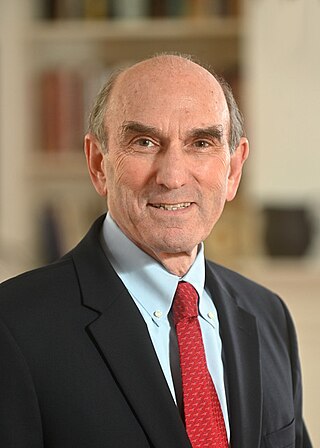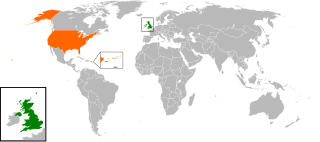Related Research Articles

Canada's long and complex relationship with the United States has had a significant impact on its history, economy, and culture. The two countries consider themselves among the "closest [of] allies". They share the longest border between any two nations in the world, and also have significant military interoperability. Both Americans and Canadians have generally ranked each other as one of their respective "favorite nations". Nonetheless, Canadian peacekeeping is deeply embedded in Canadian culture and a distinguishing feature that Canadians feel sets their foreign policy apart from the United States. Canadian anti-Americanism has also manifested itself in a variety of ways, ranging from political, to cultural.
"Rogue state" is a term applied by some international theorists to states that they consider threatening to the world's peace. These states meet certain criteria, such as being ruled by authoritarian or totalitarian governments that severely restrict human rights, sponsoring terrorism, or seeking to proliferate weapons of mass destruction. The term is used most by the United States ; in his speech at the United Nations (UN) in 2017, U.S. President Donald Trump reiterated this phrase. U.S. politicians have used the term to describe countries such as Iran, Syria, North Korea, Afghanistan, Cuba and Venezuela. The term has been applied by other countries as well.

The Bush Doctrine refers to multiple interrelated foreign policy principles of the 43rd President of the United States, George W. Bush. These principles include unilateralism, preemptive war, and regime change.
Neoconservatism is a political movement that began in the United States and the United Kingdom during the 1960s during the Vietnam War among foreign policy hawks who became disenchanted with the increasingly pacifist Democratic Party and with the growing New Left and counterculture of the 1960s. Neoconservatives typically advocate the unilateral promotion of democracy and interventionism in international affairs, grounded in a militaristic and realist philosophy of "peace through strength." They are known for espousing opposition to communism and political radicalism.

Elliott Abrams is an American politician and lawyer, who has served in foreign policy positions for presidents Ronald Reagan, George W. Bush, and Donald Trump. Abrams is considered to be a neoconservative. He is currently a senior fellow for Middle Eastern studies at the Council on Foreign Relations. He served as the U.S. Special Representative for Venezuela from 2019 to 2021 and as the U.S. Special Representative for Iran from 2020 to 2021.
A United States presidential doctrine comprises the key goals, attitudes, or stances for United States foreign affairs outlined by a president. Most presidential doctrines are related to the Cold War. Though many U.S. presidents had themes related to their handling of foreign policy, the term doctrine generally applies to presidents such as James Monroe, Harry S. Truman, Richard Nixon, Jimmy Carter and Ronald Reagan, all of whom had doctrines which more completely characterized their foreign policy.

The Special Relationship is a term that is often used to describe the political, social, diplomatic, cultural, economic, legal, environmental, religious, military and historic relations between the United Kingdom and the United States or its political leaders. The term first came into popular usage after it was used in a 1946 speech by former British Prime Minister Winston Churchill. Both nations have been close allies during many conflicts in the 20th and the 21st centuries, including World War I, World War II, the Korean War, the Cold War, the Gulf War and the war on terror.

Paula Jon Dobriansky is an American diplomat, public official, and foreign policy expert who served as Under Secretary of State for Global Affairs (2001–2009) and the President's Envoy to Northern Ireland (2007–2009). A specialist in Central/East European affairs and the former Soviet Union, trans-Atlantic relations, and political-military affairs, Dobriansky held key senior roles in the administrations of five U.S. presidents.
Globalism has multiple meanings. In political science, it is used to describe "attempts to understand all of the interconnections of the modern world—and to highlight patterns that underlie them". While primarily associated with world-systems, it can be used to describe other global trends. The concept of globalism is also classically used to focus on ideologies of globalization instead of its processes ; in this sense, "globalism" is to globalization what "nationalism" is to nationality.

Robert Bruce Zoellick is an American public official and lawyer who was the 11th president of the World Bank Group, a position he held from July 1, 2007, to June 30, 2012. He was previously a managing director of Goldman Sachs, United States Deputy Secretary of State and U.S. Trade Representative, from February 7, 2001, until February 22, 2005. Zoellick has been a senior fellow at Harvard's Belfer Center for Science and International Affairs since ending his term with the World Bank. He is currently a Senior Counselor at Brunswick Group.

Relations between the United Kingdom and the United States have ranged from military opponents to close allies since 1776. The Thirteen Colonies seceded from the Kingdom of Great Britain and declared independence in 1776, fighting a successful revolutionary war. While Britain was fighting Napoleon, the two nations fought the stalemated War of 1812. Relations were generally positive thereafter, save for a short crisis in 1861 during the American Civil War. By the 1880s, the US economy had surpassed Britain; in the 1920s, New York City surpassed London as the world's leading financial center. The two nations fought Germany together during the two World Wars; since 1940, the two countries have been close military allies, enjoying the Special Relationship built as wartime allies and NATO partners.

In political studies, surveys have been conducted in order to construct historical rankings of the success of the presidents of the United States. Ranking systems are usually based on surveys of academic historians and political scientists or popular opinion. The scholarly rankings focus on presidential achievements, leadership qualities, failures, and faults. Popular-opinion polls typically focus on recent or well-known presidents.
The term liberal hawk refers to a politically liberal person who supports a hawkish, interventionist foreign policy.

Today, Germany and the United States are close and strong allies. In the mid and late 19th century, millions of Germans migrated to farms and industrial jobs in the United States, especially in the Midwest. Later, the two nations fought each other in World War I (1917–1918) and World War II (1941–1945). After 1945 the U.S., with the United Kingdom and France, occupied Western Germany and built a demilitarized democratic society. West Germany achieved independence in 1949. It joined NATO in 1955, with the caveat that its security policy and military development would remain closely tied to that of France, the UK and the United States. While West Germany was becoming a Western Bloc state closely integrated with the U.S. and NATO, East Germany became an Eastern Bloc satellite state closely tied to the Soviet Union and the Warsaw Pact. After communist rule ended in Eastern Europe amid the Revolutions of 1989 and the fall of the Berlin Wall, Germany was reunified and the allied powers subsequently restored full sovereignty to Germany with the Treaty on the Final Settlement with Respect to Germany. The reunified Federal Republic of Germany became a full member of the European Union, NATO and one of the closest allies of the United States. Since 2022 Germany has been working with NATO and the European Union to give aid to Ukraine in the ongoing Russian invasion of Ukraine. In the process Germany is sharply reducing its dependence on Russian oil and gas. Germany has the third-largest economy in the world, after the U.S. and China. Today, both the countries enjoy a "special relationship".
These are the references for further information regarding the history of the Republican Party in the U.S. since 1854.

Diplomatic relations between Denmark and the United States of America began in 1783. Both countries are members of the Arctic Council, OECD, OSCE, NATO and the United Nations.

Philip Thomas Reeker is an American diplomat and career foreign service officer with the Department of State who currently serves as the senior advisor for Caucasus negotiations. He was previously Chargé d'affaires of the United States mission to the United Kingdom from 2021 to 2022 and acting assistant secretary of state in the Bureau of European and Eurasian Affairs from 2019 to 2021.
In international relations, the term smart power refers to the combination of hard power and soft power strategies. It is defined by the Center for Strategic and International Studies as "an approach that underscores the necessity of a strong military, but also invests heavily in alliances, partnerships, and institutions of all levels to expand one's influence and establish legitimacy of one's action."
Criticism of the United States government encompasses a wide range of sentiments about the actions and policies of the United States. Historically, domestic and international criticism of the United States has been driven by its embracement of classical economics, manifest destiny, hemispheric exclusion and exploitation of the Global South, military intervention, and alleged practice of neocolonialism, with its unipolar global position giving it a special responsibility which many feel is misused purely for self-gain, in contradiction with the beliefs and values of American people. This perpetuates negative sentiment towards the US and fuels criticism which is pervasive around the world.
History of United States foreign policy is a brief overview of major trends regarding the foreign policy of the United States from the American Revolution to the present. The major themes are becoming an "Empire of Liberty", promoting democracy, expanding across the continent, supporting liberal internationalism, contesting World Wars and the Cold War, fighting international terrorism, developing the Third World, and building a strong world economy with low tariffs.
References
- ↑ Harrell, David Edwin (2005). "The United States in World Affairs, 1900-1920". Unto a Good Land: A History of the American People. Grand Rapids: Wm. B. Eerdmans Publishing Company. ISBN 0-8028-2945-7.
- ↑ History Debunks Bush Myth by Jim Lobe
- ↑ Ramet, Sabrina P.; Christine Ingebritsen (2002). "The United States and Europe". Coming in from the Cold War: changes in U.S.-European Interactions since 1980. Lanham, Maryland: Rowman & Littlefield. p. 4. ISBN 0-7425-0017-9.
- ↑ Helene Cooper (April 6, 2012). "Obama Embraces National Security as Campaign Issue". The New York Times . Retrieved April 6, 2012.
- ↑ "'Locked & Loaded' Trump's 1960s Cowboyism re: N. Korea & Venezuela". 12 August 2017.